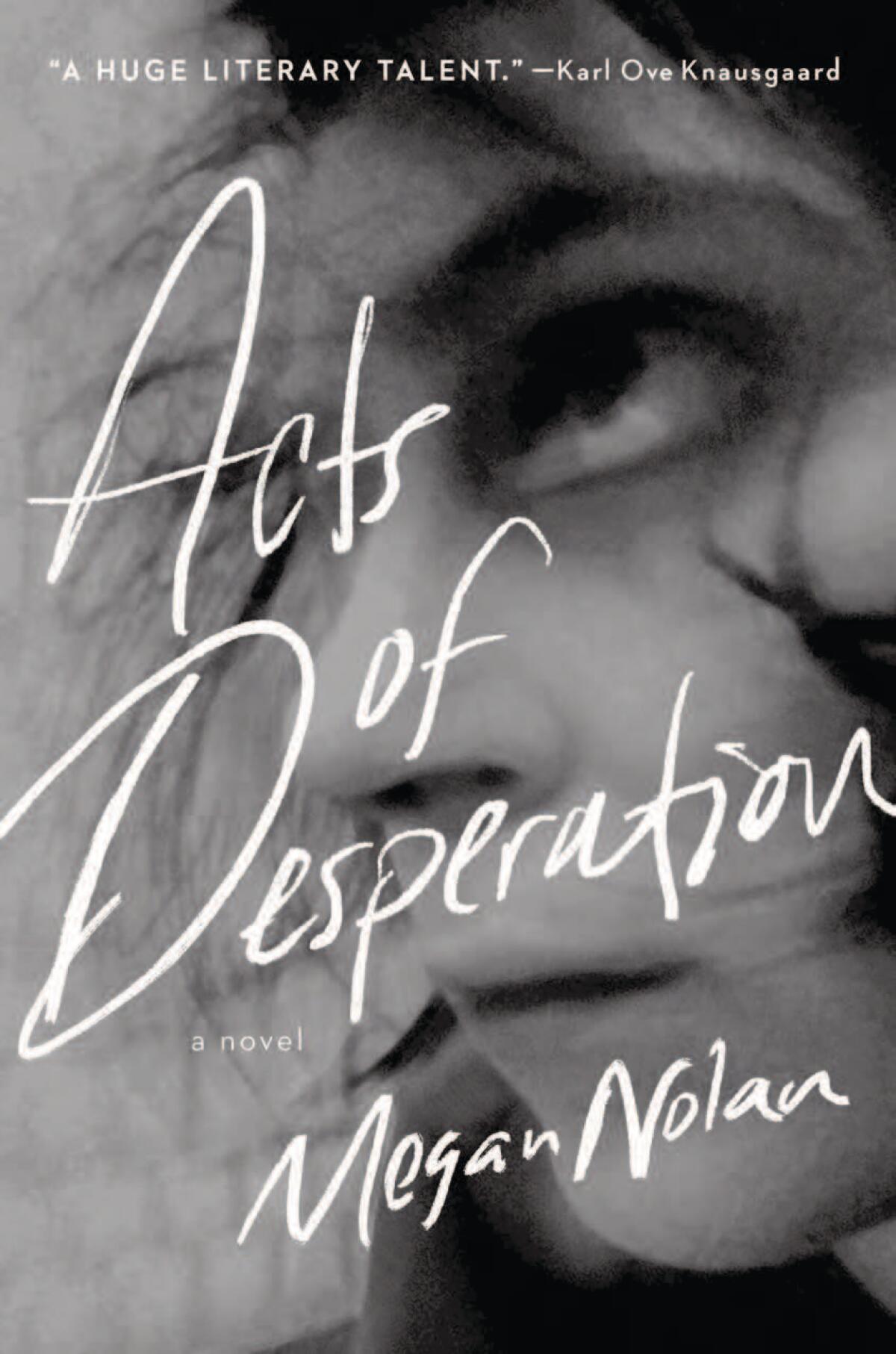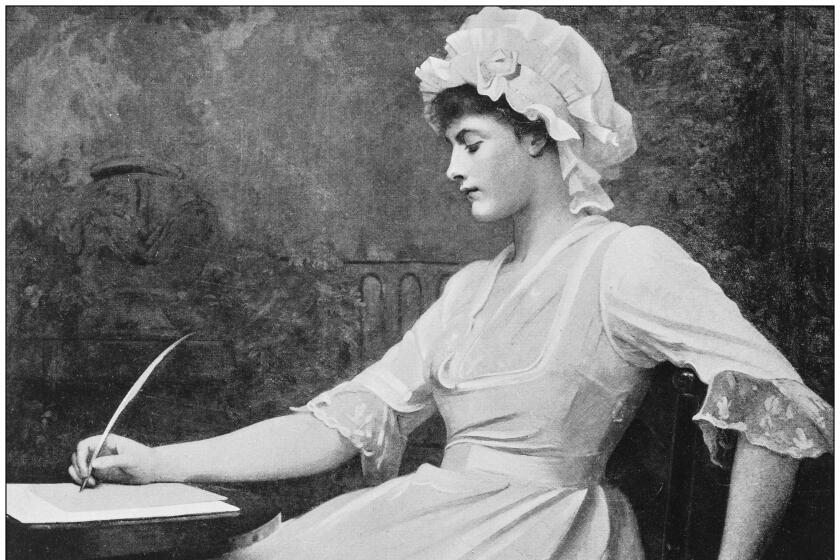Review: Why do women stay with toxic men? A debut novel has some uncomfortable answers

On the Shelf
Acts of Desperation
By Megan Nolan
Little, Brown: 288 pages, $27
If you buy books linked on our site, The Times may earn a commission from Bookshop.org, whose fees support independent bookstores.
The template is familiar: a young woman, miserable, falls hard for an attractive, withholding man. He’s older, a writer, with “cruel” grey eyes and large hands, holding forth at a gallery opening. When she makes a casual self-deprecating comment about not understanding art — positioning herself already as the pupil — he responds earnestly, “Isn’t it our job to understand: why these objects, in this particular room?” and the stage is set. I know this guy, thinks the reader. He’s going to destroy her.
So begins Irish writer Megan Nolan’s wrenching debut, “Acts of Desperation,” a chronicle of a sinister, deeply imbalanced and unsettlingly familiar romantic relationship, vivified by alcohol and laced with the threat of violence. Nolan is likely to draw facile comparisons to her brilliant compatriot Sally Rooney, whose work also turns a spotlight on power dynamics in relationships, but that move won’t do justice to the darkness in this book. If we must go Irish, a writer like Kevin Barry, whose 2019 novel “Night Boat to Tangier” limns murky, maudlin disasters of love, is closer literary kin to Nolan. For this is not a novel about coeds. It’s a book about looking for your own stuttered, partial reflection in the hall of mirrors that is a narcissist’s affection. It’s about chasing oblivion in the whirling, flaming speedball of heavy booze and violent sex.
Not long after the opening scene, Nolan’s unnamed narrator gives herself completely to the Irish-Danish writer, Ciaran, whom she considers on sight to be “better than me in both essential and superficial ways.” In the background looms Freja, Ciaran’s lissome, Nordic ex-girlfriend, who is trying to win him back. (And does, briefly — a betrayal that raises the stakes.) As in many stories of fragile, possessive hetero love, an equally tormenting relationship arguably takes place between women and it too carries an erotic charge. Freja undermines the narrator in her frequent emails to Ciaran: “She’s cute I can see, but a little chubby for you, no?” When Ciaran is out, the narrator finds herself three years deep in Freja’s Instagram, looking at her collarbones as she polishes off a second bottle of wine.
But the most compelling negotiation in the book is between warring parts of the narrator herself. Subject to Ciaran’s moods and casual cruelty, the woman begins to split apart. On the one hand, she knows she must do whatever she can to keep his love. On the other hand, she knows something isn’t right. That these two ideas can hum along in tandem may seem odd, but anyone who has been in an all-consuming relationship will recognize this duality.
Novelist Lynn Steger Strong on the revolutionary passivity of Rachel Cusk, Ottessa Moshfegh and Sally Rooney — how we’ve misread them and what comes next.
“Acts of Desperation” is a first-person narrative with a confessional tone. (“All love stories begin with the letter I,” as Joanna Walsh wrote in her 2018 novel “Break.up”). And the narrator, in her very early 20s, feels painfully young at times. Here and there, the reader finds herself thinking, Snap out of it! Ciaran isn’t even that great! Then remembers that the details, even the man, are not the point.

Our narrator is lost to a devotion that borders on the religious. Here, Nolan often slips into cliché, drawing analogies to redemption or purification through love. Ciaran’s body is a “site of prayer” and love a “force which would clean me.” Leaning on the tired old idea of women as “dirty,” she writes, with excessive neatness: “I knew that if I could be smaller, smaller, less and less, if I could be tidied,” she writes, “then he would love me fully and properly.”
But elsewhere Nolan’s writing gleams with dark precision. Her narrator’s piercing, almost perverse self-awareness makes the action both more sad and more urgent. Cooking and cleaning their apartment, she realizes, “Living with him forced me to treat myself in a way I was not able to alone.” Of Ciaran, she writes, “He looked like an illustration of superiority, like propaganda for the idea of a man.” Certain truths are dropped unceremoniously and land with a pleasing thud, as when the narrator refers to herself as a functional object for men, “safe and useful as a sink.”
The action of the novel takes place between 2011 and 2015, but the narrator’s future self interjects throughout, in dispatches from “Athens, 2019” that read like they were written with some distance and, blessedly, some therapy. In these asides, she tries to prove that being in thrall to this kind of self-destructive romance is a choice. She wants to head off the reader’s judgment. She cynically attests that she has passed through the “sordid checkpoints of the wounded woman,” suffered things “objectively worse” than the harrowing events she describes with Ciaran. But “female suffering is cheap and is used cheaply by dishonest women who are only looking for attention,” Nolan writes, and she refuses to lay out all of her character’s trauma for the reader’s breezy consumption.
“My Dark Vanessa” is the latest and most unsettlingly effective book in a timely genre.
In these and other sections, Nolan performs her feminist fluency and conveys all the while a sense of fatigue, an acknowledgement that this is both new and not new. There is a sameness to all our stories. The decision to hold in suspicion the very form she is enacting is what makes the book refreshing and complex. What “Acts of Desperation” illuminates best is the chasm, sadly still enormous, between feminist politics and personal predicaments of love, sex and romance.
The novel is a powerful counterweight to the notion that young women today are free to define themselves apart from men. Nolan shows that as long as we are grappling with ideas about women’s desirability that have been authored by men, women are in a sense realized by the male gaze. Remembering herself on a date, high on her own hotness, the narrator thinks, “I was strawberry ice cream, blue sky. I smelled so good it was crazy.” But the question the book raises echoes disturbingly even after it’s over: Does participating willingly in your own degradation lessen its impact?
There are many stories currently circulating — in books, films and the press — about relationships like the one Nolan writes about, and I marvel at my bottomless appetite for them. It isn’t only prurience, nor simply that it makes me feel less alone. It is satisfying to see a young female narrator wrest control of the story of her debasement, to show both its specificity and its utter sameness, her victimhood and her complicity. Each story carries with it some hope that we might understand, slightly better or perhaps just differently with each iteration: Why these objects, in this particular room.
Nina Renata Aron’s memoir, “Good Morning, Destroyer of Men’s Souls,” doubles as an ennobling history of recovering enablers of addiction.
Aron is the author of “Good Morning, Destroyer of Men’s Souls: A Memoir of Women, Addiction, and Love.”
More to Read
Sign up for our Book Club newsletter
Get the latest news, events and more from the Los Angeles Times Book Club, and help us get L.A. reading and talking.
You may occasionally receive promotional content from the Los Angeles Times.







